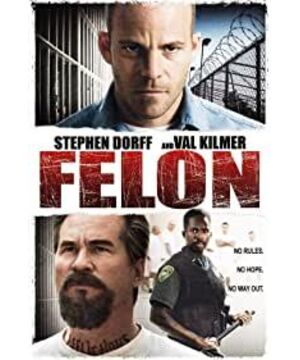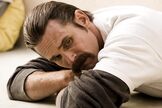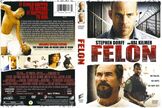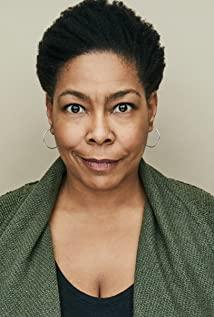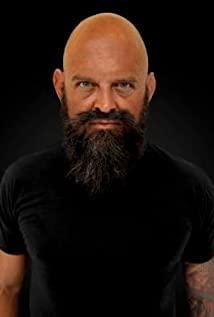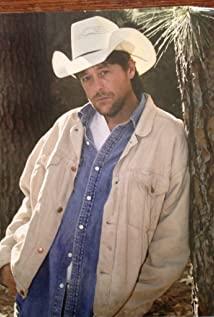The protagonist of the film, Wade Porter, killed the thief by mistake in self-defense, so he was imprisoned, and what awaited him was a dark struggle in the prison. In this film, what we see is the harsh, real and personal experience that prison life brings to Wade about his desire to survive, and we also see Wade's inner mental journey, who has gradually become numb in order to survive. As Wade's good friend John Smith said: "In the beginning you will feel bloody and cruel, then you will feel a little pity, and finally you will be insensitive and even gloating."
Wade's only friend in prison was his The same roommate John Smith, John was sentenced to life service for killing the family. However, John's killing of other people is not arbitrary, but out of his love for his family. Like Wade, John was largely "hijacked" and imprisoned. Wade was originally a philosopher, full of love for his family and family, but because of the killing of his own child, he took revenge on the killer and the killer's family in the same way. He wants to let the killers know "the painful feeling of separation from seeing one's own family being dismembered!" If you only see John's murder record, you will think he is a devil, and after knowing the reason for his murder, we will Great sympathy and even respect for John. He wanted the death penalty but was not sentenced to death.
But for Jackson, the prison guard, these prisoners are "the dregs of destroying society, and they should be destroyed." Therefore, Jackson, for these moral "reasons", and also out of his revenge for having been killed by prisoners, violated a series of relevant regulations in a careful arrangement, he will go to the "activity room" (more precisely) every day. The felons who are said to be the Colosseum carry out various disguised insults and persecutions.
Before the end of the film, we basically cannot see the meaning and light of justice and fair punishment for the dignity of individual life. All punishment measures and measures against punishment are determined based on the position of the power structure, without the slightest justice and fairness. This prison is like the Colosseum in ancient Rome. The guards of the prison are sitting on the "stand". Below the "stand" is a group of "slaves" who have no freedom. They are fighting bloody hand-to-hand combat for their will to survive. fighting.
In his Discipline and Punishment, Foucault discusses the power structure of domination and proposes a theory of "discipline and surveillance", although Foucault's sociological theory of prisons can help us with the power structure of society as a whole However, our reduction of this theory to basic prison society research still works.
In the film "Prison Life", we can see that the basic zoological attributes of human beings are brought to the extreme under a regulated power structure arrangement: simple hand-to-hand combat, racist group behavior, simple survival The power reigns of desire and so on. The social attributes of people appear to exist only when Wade and John communicate with the outside world, such as the importance of family, the value of family and friendship, and so on.
Although the setting of power structure is also one of the basic social attributes of human beings to a large extent, the animal world still has the form of power structure, but it is only a relatively low-level expression. In "Prison Life", we see that the power structure of Wade and these felons is obviously simple and low-level, and whoever has the power will win respect and be deterred. Wade also gradually went from being an honest citizen to being a ruthless power-manipulator, because he became a power-manager who was hated by Jackson, his watchman, his sentence was added, and his His wife is leaving him. This made him even more angry, and he began to continue to exercise his strength and vent his inner grief.
In addition to the intertwined and complex power structure of the felons, there is the power structure of the custodians. Although Jackson is the supervisor of the guards, he can do whatever he wants with the felons. However, among his subordinates, there are also people who are dissatisfied with this power structure: such as new young guards, retired guards who want to live a stable life, etc. They all want to end this power structure. This kind of prison life is similar to the Colosseum in ancient Rome.
Surveillance and being watched, discipline and discipline, the emergence of this power structure is very well explained in the film "Prison Life". The power they have to monitor and discipline is not because their exercise of power is an endowment that conforms to procedural justice and value justice, but only because they have power, or simply put, they just hold guns and wear police uniforms. And likewise, being watched and disciplined, they are not all oppressed by the power structure because of their own injustice, but probably simply because they are prisoners.
This film, although not in its plot setting, explores the significance and impact of the domination structure on social psychology like the film "Death Experiment". However, we can see the same conclusion from this film as "Death Experiment": the existence of a distorted power structure is an extremely important and even decisive factor for the distortion of human nature.
While the film ends with Jackson's death and John's devotion as a way to end this irrational pattern of power structures, Jackson's presence in the film does not represent Jackson as a tyrannical and tyrannical individual. ruler. Jackson represents a power structure symbol, and Jackson's death is the end of a domination structure model.
There is a thought-provoking scene at the end of the film: the little skinhead leader who framed Wade at the beginning was finally put into the cell of the leader who originally belonged to Wade by the young caretaker. He protested to the warden, "Jackson allowed me to serve my sentence alone." But the young warden said to him, "Jackson is dead." For the prison and the young warden, Jackson The symbol of power domination represented is over, and perhaps everything will take on a new look.
The end of this irrational power structure model relies on the method agreed by Wade and John at the end of the film and the resistance of all felons to this ruling structure. Wade was the first to express his resistance and insubordination to Jackson (a symbol of the power structure). John then stood in front of Wade to meet his wish to be reunited with his family in heaven. Stand up against Jackson's rule of power.
At the end of the film, Wade recalls John sending him letters: "Do whatever it takes to protect your family and destroy the planet to get back what we really want." Humans and what they want are ultimately not only It is only the domination of low-level power structures, but the indomitable spirit of kinship, friendship and the struggle for truth. However, Wade finally ended this unreasonable power structure and ruling model with his strength and persistence for his family and relatives, and he could also reunite with his wife and son, Wade's "prison life" also finally ended.
As Wade says at the end of the film: "Prison life makes you cold, but it tells you what is most important to you: family and loyalty."
View more about Felon reviews


